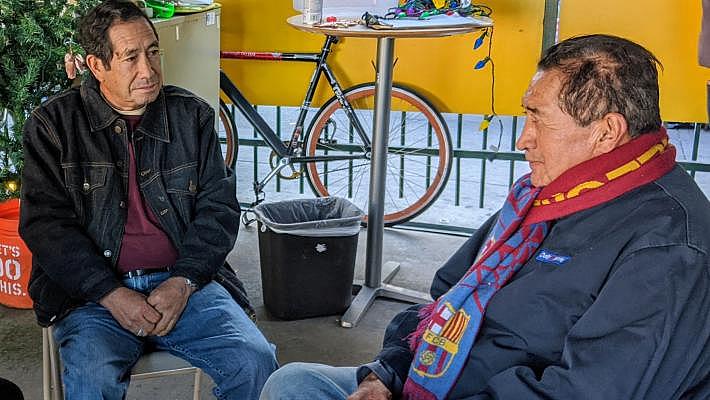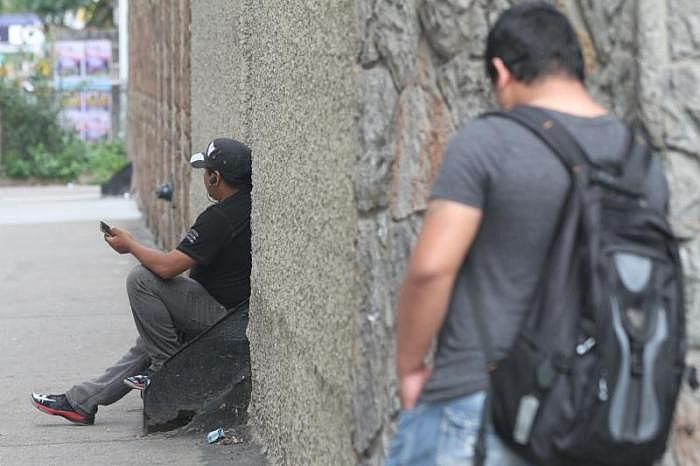Older day laborers face health and economic uncertainty in time of coronavirus

Prospero de León (center) and Rigoberto Torres (right) last December at the downtown Day Labor Center
(Jacqueline García / La Opinión)
Many jornaleros at a day labor center in downtown Los Angeles have barely seen any work for the last two weeks due to COVID-19. Those who show up every day are determined to try to make a few bucks. But those waiting for a lucky break may be putting their health at risk.
Jorge Nicolas, supervisor of the CARECEN Day Labor Center, said the pandemic is most concerning for elderly workers.
“They are the most vulnerable group (to COVID-19), but the necessity to earn any money forces them to be here,” said Nicolas. “They depend on people with money to come and hire them for any job.”
While some elderly workers show up early in the morning with the hopes of finding any odd job, others have been missing for days, like 71-year-old Prospero de León.
The Guatemalan day labor worker had been going to the CARECEN Day Labor Center for years in search of a job. But now, a friend says, he isn’t doing well: “He didn’t have any job, he couldn’t even pay his phone.”
Construction is still allowed in Los Angeles County, but the kind of casual jobs that workers like de León used to easily obtain have dried up since stay-at-home orders have gone into effect.
The set-up at the day labor center has changed significantly too since COVID-19 restrictions were imposed. A place where dozens of workers would gather on any given day now doesn’t allow more than 10 at a time. They stay outside the center and enter one by one to go to the restroom or to participate in a one-on-one orientation about wage theft or disability.
But those services can’t prevent what may soon become a dire situation for many. For undocumented workers who are just scraping by, there is little in the way of a safety net right now, either when it comes to help making up for lost income or getting health care if they become ill.
The USC Center for Health Journalism Collaborative interviewed De León last December, when he seemed to hold his life in a delicate balance.
De León had no plans to retire before the COVID-19 pandemic struck. In fact, he couldn’t afford to do so due to his undocumented status. He does not qualify for benefits such as Social Security, Medicaid or Medicare.
“I have been living in that small room for 15 years and I share it with two younger men. In total, we pay $900,” said De León at the time, who lived in the Westlake area.
At first sight, De León seems to be much younger than his 71 years, with his slim profile, well-combed black hair and neatly dressed. Few would guess this respectful, courtly man with a gentle voice does the hard work of a day laborer.
"People come here looking for gardening, hauling or construction, but I specialize in painting and varnish," he said on a cold morning last December.
At that time, while De León was waiting for a job, he said he appreciated being able to work and have a roof over his head. He managed to stay healthy and active, despite continuously smoking cigarettes.
He remembered his most serious health problem came about a year ago when he had to go to the emergency room due to prostate discomfort.
"They did some tests and told me that it is because I don't drink water," said De León.
The worker said he briefly benefitted then from emergency Medi-Cal — part of the state health coverage program for low-income individuals — which can only be used in emergencies and not for preventive care.
De León said he does not suffer from chronic diseases, nor does he take medication, which allows him to avoid the doctor and continue working to pay for his most important expense each month, $300, his share of the rent.
Unlike De León, many undocumented immigrants struggle with health problems. Diseases such as diabetes, tuberculosis, and kidney failure are the most common among the older undocumented community, according to a study by the University of California, Riverside (UCR).
Older adults and people who have chronic medical conditions, such as heart and lung disease, diabetes, cancer, and hypertension, are at higher risk for worse outcomes when contracting COVID-19, according to the Centers for Disease Control and Prevention (CDC). This is because their immune system weakens with age, making it more difficult to fight infectious diseases.
Chronic diseases are more common as people age. They can compromise the immune system and make people more vulnerable to serious complications. These conditions can be very expensive and complex to treat, especially without insurance.
The 2019 UCR study “The Health Needs of Undocumented Older Adults” pointed to the lack of access to medical centers, high health care costs, and language barriers as the main obstacles preventing undocumented residents from receiving adequate medical care.
Starting in 2020, low-income undocumented immigrants ages of 19 to 25 became eligible to receive full scope Medi-Cal. But the rest of the undocumented population remains in limbo, including elderly workers at the day labor center.
California state Sen. Maria Elena Durazo (D-Los Angeles) continues to push for expanded health care coverage for low-income undocumented seniors who are 65 years and older. But it’s unclear if the bill she co-sponsored, SB 29, has a chance at passage given new budget concerns in the state legislature due to economic disruptions caused by COVID-19.
If coverage is expanded, an estimated 25,000 adults age 65 and older would qualify for full scope Medi-Cal in California, according to the UCR study.
As the COVID-19 pandemic continues to spread, Durazo also has urged Gov. Gavin Newsom to extend Medi-Cal coverage for coronavirus-related testing and treatment to all Californians, regardless of immigration or insurance status.
Jornaleros with different medical benefits

Jornaleros wait for jobs on the streets everyday even now despite the pandemic of the cornavirus.
(Mariela Lombard/El Diario NY)
Rigoberto Torres, 63, works as a roofer and paints houses. Unlike many of his peers, Torres is a U.S. citizen who has insurance through Medi-Cal. In two years he will apply for Medicare, the government health insurance program for people over age 65.
Torres has been a day laborer for many years and has been a member of the CARECEN Day Labor Center for the past 14 years. He said he has been without a job since March 16 when the COVID-19 outbreak expanded significantly in L.A. County and the government took measures to prevent big groups from gathering. For his own health, Torres decided to stay home.
“I’m afraid to go out due to my age,” explained the native of El Salvador. "But there are other (undocumented) workers who are doing very bad economically and they worry because rent is approaching. Rent doesn’t forgive.”
Torres has three adult children, but he doesn’t want to become a burden for them, so he continues to work. Prior to the pandemic, he said his work schedule changed constantly; some weeks he worked four days and others only one.
Torres said he developed problems in his bronchi, the major air passages of his lungs, from exposure to asphalt in roofing work. “I have to go to the clinic every three months to see the doctor and every month to pick up my inhalers,” he said.
When he needs to go to the doctor, he calls his local clinic and goes for free. They even pick him up and drop him off. This is a luxury his fellow workers who are undocumented don’t have.
"I have seen several (jornaleros) who do not even have money for the bus to go to the clinic," Torres said.
The worker knows the ailments of age firsthand, which is why he advocates for his peers.
Torres said he saw De León a few weeks ago and he wasn’t faring very well. Nicolas, the labor center supervisor, said they plan to try to visit De León to see how he is doing.
The USC Center for Health Journalism Collaborative’s efforts to reach him recently were unsuccessful.
Back in December, asked about an uncertain future, the Guatemalan man said he was awaiting divine help.
"I have no plans for my future, because man proposes, but God disposes," said De León with a smile.
The options for the undocumented elderly
On March 27, President Donald Trump signed the CARES Act into law, which includes more than $2 trillion in economic relief in response to the COVID-19 pandemic.
The law will benefit many, but it excludes millions of undocumented immigrants, including an estimated 3 million undocumented immigrants living in California. About 70% of them are Latinos.
Although the vast majority of undocumented are working adults who pay state and federal taxes, they do not qualify for federal public benefits that include medical care (California has carved out special exceptions for free health care for low-income children and young adults who are undocumented).
The CARES Act includes about $250 billion for direct payments of $1,200 for those who earn less than $75,000 a year, plus $500 for each child. These provisions benefit taxpayers with a Social Security number, including DACA and TPS beneficiaries, with valid work permits. The law excludes millions of undocumented immigrants, including those who pay taxes using an individual taxpayer identification number (ITIN), but who do not have a work permit.
Americans are divided about whether those who are undocumented should receive government medical services. A 2019 Business Insider survey of more than 1,100 Americans asked whether or not they support extending health care benefits to everyone living in the United States regardless of immigration status.
Forty percent of adult respondents said they strongly oppose including undocumented immigrants in government-provided health care, 30% support it, 19% neither support nor oppose it, and 10% said they were not sure.
The Inland Empire, which includes San Bernardino and Riverside counties, is estimated to have around one million immigrants, of whom approximately 300,000 are undocumented. Most of them have few non-emergency health care options, especially compared to Los Angeles County, advocates say.
Javier Hernández, director of the Immigrant Justice Coalition, worked with UC Riverside to learn about the options for undocumented immigrants in need health services in the Inland Empire.
“We know that there is a county program in Riverside that provides health services to people when they need it regardless of their immigration status,” said Hernandez. “The problem is that this program doesn’t include preventive care.”
Activists say all low-income undocumented immigrants — with income at or below 138% of the federal poverty level — should be included in full scope Medi-Cal, regardless of age.
Benjamin Wood, representative of the Pomona Day Laborers Center, said it is important to continue advocating for health for all people regardless of immigration status.
"When we advocate, we show health care is not an expense but rather an investment," Wood said. “Going to the emergency room is much more expensive than getting preventive health care. With good health we can work, study and stay active. That is an investment.”
Follow the USC Center for Health Journalism Collaborative series "Uncovered California" here.

